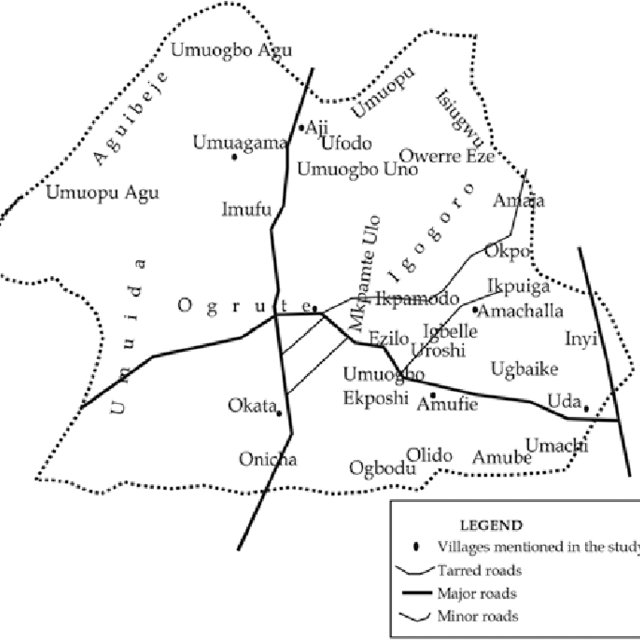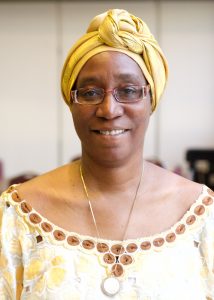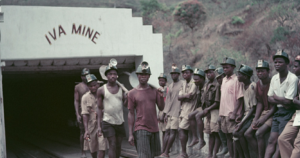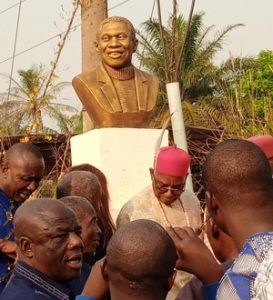
According to ancient history, the initial line of ENUGU-ancestors EZIKE’s came from the Oba of Benin. The name of the guy formerly referred to as ENUGU-great-grandfather EZIKE’s is “ENUGWU-EZIKE OBA ATTA IGARA BI IGBO N’IME.”
According to legend, the Oba from the West (Benin) traveled to Onisha via Asaba, across the stream via Aguleri to Ebenebe, and finally arrived and established in Enugu Ukwu, all in Anambra State. Since then, Enugu Ukwu has been acknowledged as the birthplace of Ezike Oba; now, Enugu Ukwu is the home of OKPUNO ZIKE. Nine elderly residents of ENUGU-EZIKE traveled to Awka in 1935 to testify in a land dispute between Enugwu Ukwu and Enugwu Agidi.
According to folklore, he first settled there and began farming and hunting before traveling across the Anambra Rivers to Igabada and subsequently Idah, both of which are today in Kogi State. He spent some time in Idah, shifting locations according to the hunting season, until one day Ezike Oba shot a large elephant and followed its trail to the Idah zone towns of Odoru and Agbokete. The animal was being pursued through the Ibagwa Ani – Ekoyi groove and up to Ugwu Eka (Hill) in Amube when it suddenly died. He eventually made Amube Hill his home and wed Ukoji, a woman from Ekoyi in Iheaka.
The nickname “ELUGWU,” which means “HILL-TOP,” was given to him as a result of his decision to settle down on a hilltop from which he could readily view a game.Together, these make up ELUGWU EZIKE OBA. On a tract of ground between Amube and Ekoyi, he later built a town. This stretch of hunting and villages has a definite historical connection. Nearly all towns and villages may trace their roots back to hunting, migration, and settlement. The earliest man as a hunter and nomad. The South African Bushmen, etc.
There are certain similarities between ENUGU-EZIKE, Benin, Igala, Idoma (Kogi state), and Enugwu-Ukwu (Anambra State). This supports the fact that they have ancestors from these places. Their clothes, headdresses (for men and women), traditional music groups (Okanga and Okeregwu), flutes (Elephant Tasks Ariwa), and obeta (for men) all reflect how similar they are (Igalla Idoma and Enugwu Ezike) The current Attah of Idah goes by the name of Ogbaje. Ossai, Ebonyi, and Odo (Benin and Enugwu-Ezike). Bows and arrows are used for both hunting and combat. Although broadly speaking they appear to be relatively similar, the majority of dialectal differences between the languages of the Enugwu-Ezike people and the inhabitants of Benin, Igala, and Idoma come from internal cultural requirements.
THE ORIGIN OF THE FOUR COMMUNITIES
Four sons were born to EZIKE OBA. He was married to AYIGWA and OSEGBE, two women. Every wife had two boys, one after the other: OSEGBE had ITODO and OZZI, while AYIGWA had EZZEDO and ESSODO. Seniority is listed in the following order: First Son, Ezzedo, and Third Essodo 4th Ozzi Itodo, the second son. When they reached adulthood, they were required to get married, and as a result, they had children with the names Udah and Uroshi.
Amufie Eze, Amachalla Okwo, Olido Ogiri Enevu, Imufu Ejagu, Igbelle Odori, and Ikpu-Iga Odori were the six children of ITODO.
Aji, Umuagama, Umu-Ogbo Ulo, Umuogbo Agu, Umuogbo Inyi, Umu-Ogbo Ekposhi, and Ufodo are among ESSODO’s seven offspring.
Twenty children by the name of Ogrute, Umuida, Umuopu, Umuopu Agu/Ogboli, Ezziolo, Mkpamte, Onicha Elugwu, Okata, Igogoro, Ikpuamodo, Okpo, Amaja, Isiuugwu, Owerre-Eze, Inyi, Ugbaike, Umachi, Amube, Ogbodu and Aguibeje were born to Ozziolo.
UMU-ITODO AS A COMMUNITY
UMU-ITODO OYERI AJIMA often said, “As a man answers, so he is.” In accordance with the polygamous family, if the couples cannot get along or the brother is deceased, the sons of the same biological mother may marry any of his maternal brothers’ wives. Ozzi and Itodo, who shared a mother, experienced the same thing. Itodo, the senior from the same mother, was repeatedly offered selected girls of marriageable age to marry. However, because he was extremely handsome, elegant, and proud, he rejected these girls time and time again. According to custom, Ozzi, his brother, received the girls in his will and, in his good faith, accepted them regardless of their condition.
This process went on for so long that Ozzi and his wives and kids took up so many sizable arable lands that Itodo considered it a challenge. When he realized what he had done, he belatedly requested a wife from the father, Ezike Oba, which was understandable given his age and standing. He therefore acquired the moniker (OYERI GI). Has it just occurred to you? You can see that Ozzi, your junior, has surpassed you both numerically and geographically.
Let me side track here – Oyeri Ajima is from Umunko in Igbo-Ektiti L.G.A. as a hunter whose duty it is to wake up early to get his prey, he was always lazy and unable to wake up early. One day, he woke late and met his mates with their games coming home jubilating for a rich hunt. Being disappointed, the next day, he rose very early and had a rich dividend – so it dawned on him. Since that episode, any lazy person, when he changes, is nick-named – (OYERI GI).
UMU-ITODO
From the above-mentioned historical background, all the four communities in Enugu-Ezike have no geographical contiguity; rather they have what may be regarded as a geographical dovetailing. Each community swoops into the other with the same culture, attire, and dialect.
UMU-ITODO: Culture, tradition and Christianity. As earlier.
UMU-ITODO: Christianity, tradition, and culture. As was already mentioned, there are no notable variations between the cultures and traditions of the four sons of Ezike Oba. The Onyishi of his village, whereas the Ezike Oba’s supreme Onyishi is in charge of all the Onyishis of the many communities. Politically, it can be divided into three categories: village Onyishi and Oha, community Onyishi and Oha, and ozike oba Onyishi and Oha federal government.
Sulieman Adukwu, a warrant chief who was Muslim, brought Christianity from Nsukka to Umu-Itodo as early as 1929–1930. He established a school in Ugwu Olidi in 1929 and 1930 before moving it to Amufie in 1931 as a result of his influence in Umu Itodo. The reason this note is important is to remind our historians that the light of Christianity, which is the mother of Education, started from Umu-Itodo and spread into the other three communities of Enugu-Ezike. This was the C.M.S. in 1935, and the R.C.M. through Chief Ayogu Ede Nweke of Amube came to Olido. Following the government’s takeover of the schools, the previous rivalries, conflicts, and competitions between the two large denominations (R.C.M. and C.M.S.) are now a thing of the
Umu-Itodo as a community is not asleep in the modern trend of things. Politically, his eminent personalities are in the government, both local and state. Social, her social interaction with other communities is cordial. Academically, her youths are spread all over the secondary schools, colleges of Education and other Higher Institutions in the country and from the look of things; Umu-Itodo looks forward to more development ventures through the products of these institutions. Economically, a few of her business men and women are waxing higher and higher and with time, which is the healer of all wounds, there will be greener light.
Imufu as a distant village in Umu-Itodo:
IMUFU was once in one village with Olido, as I’ve previously indicated, and from the historical background of the Enugu-Ezike founder as a hunter-migrator, but he left to go out in search of a game because there weren’t many attractive ones nearby. A woodland or groove between Ogrute, Umu Agama, and Umuopu Agu/Ogboli Aguibeje was the destination of his voyage. He was awestruck by the sight and found the land to be extremely fertile, vast, and protected from invasion and attack by a variety of wild animals
He gave it a name (Ime Ufu). As a result, this became the short form “IMUFU” for all the settlers.
Contrast this with the settlers in the borders of Akpanya, Agbokete, and Amaka, whose name is still ULA Adi (there is no need to go home – abbreviated form) today (UNADU). Those of Ovoko, Ibagwa, Ihakpu, Uhunowere, Iheaka, and Obukpa ancestry make up the majority of UNADU’s residents.


